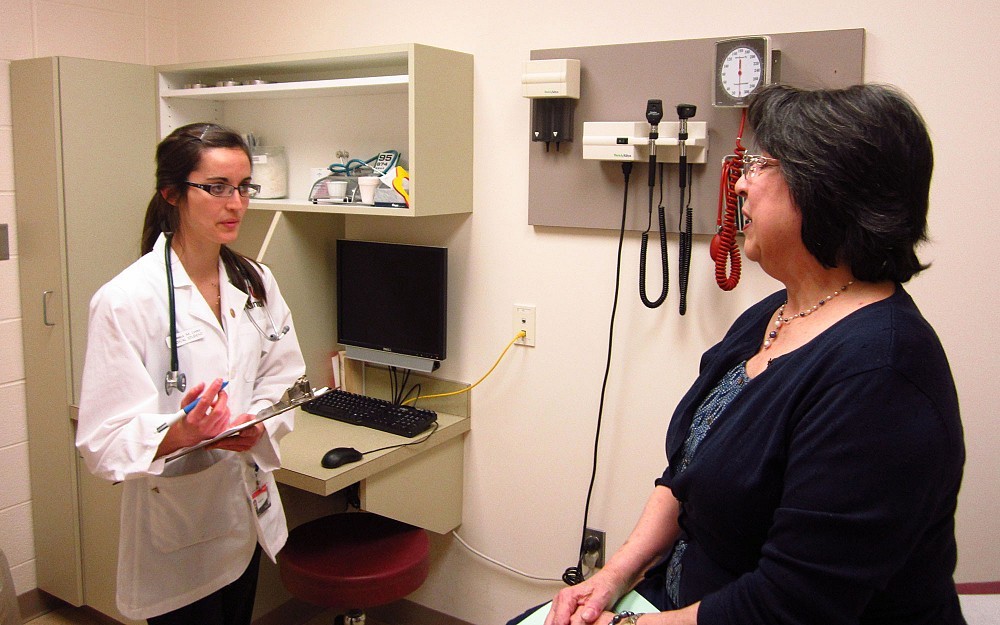
Students Launch Spanish Patient Encounter Program
Aiming to develop their own Spanish skills and improve their future patient care, a group of UC College of Medicine students developed and piloted a Spanish-speaking standardized patient encounter program this spring.
Working with the College of Medicine Simulation Center, members of the Latino Medical Student Association (LMSA) launched the pilot session of the Spanish Standardized Patient Encounters (SSPE) program for a small group of students last month and plan to continue the program in the fall.
The program pairs students with Spanish-speaking standardized patients (SP) to simulate a clinical encounter. In 30-minute sessions, students are challenged to navigate a medical encounter in Spanish, giving them an opportunity to practice their language, communication and cultural competency skills.
Students are expected to take a full medical history and focused physical exam. Following the encounter, SPs provide students with feedback on their ability to navigate the conversation and build rapport and elicit all aspects of the medical history.
LMSA President Alex Cortez partnered with Maureen Asebrook, director of the Simulation Centers Standardized Patient program, to develop the SSPE. As a non-native Spanish-speaker, Cortez says his desire to improve his own language skills during medical training motivated him to establish the SSPE program.
"For those students who enter medical school with some level of Spanish proficiency, there are no opportunities for them practice their medical Spanish in a simulated clinical encounter, says Cortez. "This is concerning not only because of the gap it leaves in medical education, but also because students with limited Spanish are at times called upon to interpret in the clinical setting.
He says the SSPE program aims to provide students with a safe, controlled environment in which they can build confidence and improve communication skills.
Most importantly, he says the program fits into one of LMSAs principal goals: to develop culturally and linguistically competent physicians who can meet the health care needs of the Latino patients they encounter.
"It is well documented that language barriers negatively impact the quality of health that patients receive, says Cortez. "By providing students with the opportunity to further develop their medical Spanish, we can help them achieve competency in serving their Latino patients, which reduces the disparity gap for the Latino community.
Three students participated in the pilot SSPE program this spring: first-year students Gabriela Lopes and Alicia Barclay and second-year Christopher Doyle.
"The Spanish-speaking patient encounter was a great opportunity for me to flex my Spanish-speaking prowess with native Spanish speakers and navigate some of the language dynamics I can expect to experience with actual patients, says Barclay. "It allowed me to realize there are significant factors to consider within medical Spanish, including patient dialects, health literacy and cultural appropriateness.
Doyle said the program helped him realize that cultural competence isn't an innate quality, but rather a skill that medical students must consciously work to develop.
"The SSPE really helped me to identify my areas of strength as well as ways to improve so in the future my real patients, regardless of primary language, can receive good care.
Cortez says the LMSA will continue the SSPE program in the fall, with sessions open to all interested students and residents. Currently, the program is for individuals with conversational fluency in Spanish, but the group plans to eventually expand it to serve students with minimal or no fluency. To learn more, email cortez.alexr@gmail.com.
Related Stories
Information Security Roadshow spreads awareness
May 3, 2024
The University of Cincinnati's Office of Information Security launched a series of 18 in-person sessions from January to April 2024, drawing nearly 350 attendees from the staff of various UC colleges and units. The Information Security Roadshow series aimed to equip the audience with knowledge on prevailing cyber threats, prevention strategies, how to report incidents and resources to stay informed and secure.
Local 12: Diabetes study focuses on how long blood sugar control...
May 3, 2024
The University of Cincinnati's Robert Cohen spoke with Local 12 about the GRADE study that shows how a new medication needs to be developed to help treat people with type two diabetes.
Local media cover $13.5 million gift benefiting ALS research and...
May 2, 2024
A historic $13.5 million gift from the estate of Hugh H. Hoffman will revolutionize amyotrophic lateral sclerosis (ALS) at the ALS Multidisciplinary Clinic at the University of Cincinnati Gardner Neuroscience Institute.
